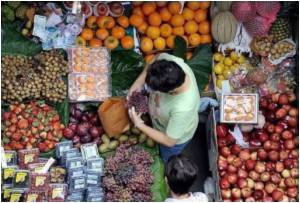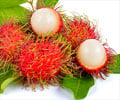Smack in the midst of London's urban jungle, an apple tree heavy with fruit hangs over the road from a private garden, unnoticed by passers-by

The city pickers' motivation is two-fold: partly in protest about tonnes of London fruit regularly left to rot, and partly out of environmental concern to promote locally-sourced food.
And they have a wealth of produce to choose from in one of the world's greenest capitals, proud of its many parks, green spaces and private gardens.
"Are those edible?" asked a man, intrigued, as he walked his dog on the leafy north London street where Kenyon and Barrett toiled away.
In reply, Kenyon bit into a slightly dented but still shiny apply. "It has a pink flesh, it's pretty sour but they make nice red juice," he said.
Most of the harvesters are volunteers but their numbers are swelling in London, a city of seven million people with a plentiful supply of trees -- but many of them unnoticed by busy local residents.
Advertisement
Choosing streets at random, the pickers take from publicly accessible trees and parks or knock on house doors to ask owners of fruit-filled gardens if they can harvest them.
Advertisement
The Organiclea association, which Barrett works for, collected about 30 tonnes of fruit last year -- mostly apples but also pears, plums, figs, nuts and cherries.
The fruit is sold either in seasonal food boxes along with vegetables or is pressed into juice. Other similar ventures distribute pickings to schools or organisations that work with homeless people.
"We are not trying to claim all these fruits are for sale. We are trying more to encourage everyone to see what is there and to make use of it," Barrett told AFP.
And it seems to be working. "We used to collect from the grounds of a hospital. One year, they said: 'We're sorry, we are using the fruit'," she said, smiling.
Big on the pickers' agenda is advocating the benefits of eating locally-grown food as the environmentally-friendly option.
"We don't create the kind of problems that the big industry food system can create in terms of too much packaging and reduced nutrition because things have been stored for such a long time. And then there are the food miles they create..." she said.
The volunteers say the London fruit is nutritious and tasty, and you can find varieties that are not stocked by major retailers.
They also insist there is no risk of contamination by pollution, a claim endorsed by findings at the University of Sheffield in northern England where researchers examined city fruit and found it safe.
However, many remain cautious, like Ahmed Iftikhar, a 26-year-old Pakistani who takes care to wash the pears he eats from a neighbour's tree.
An enthusiastic picker, Iftikhar struggles to get all the pears down before they rot -- so welcomed the harvesters when they offered to help during one of their rounds.
With their long pole, the team got some of the hardest-to-reach pears from the top of the tree -- a bumper crop from the "big smoke".
Source-AFP














